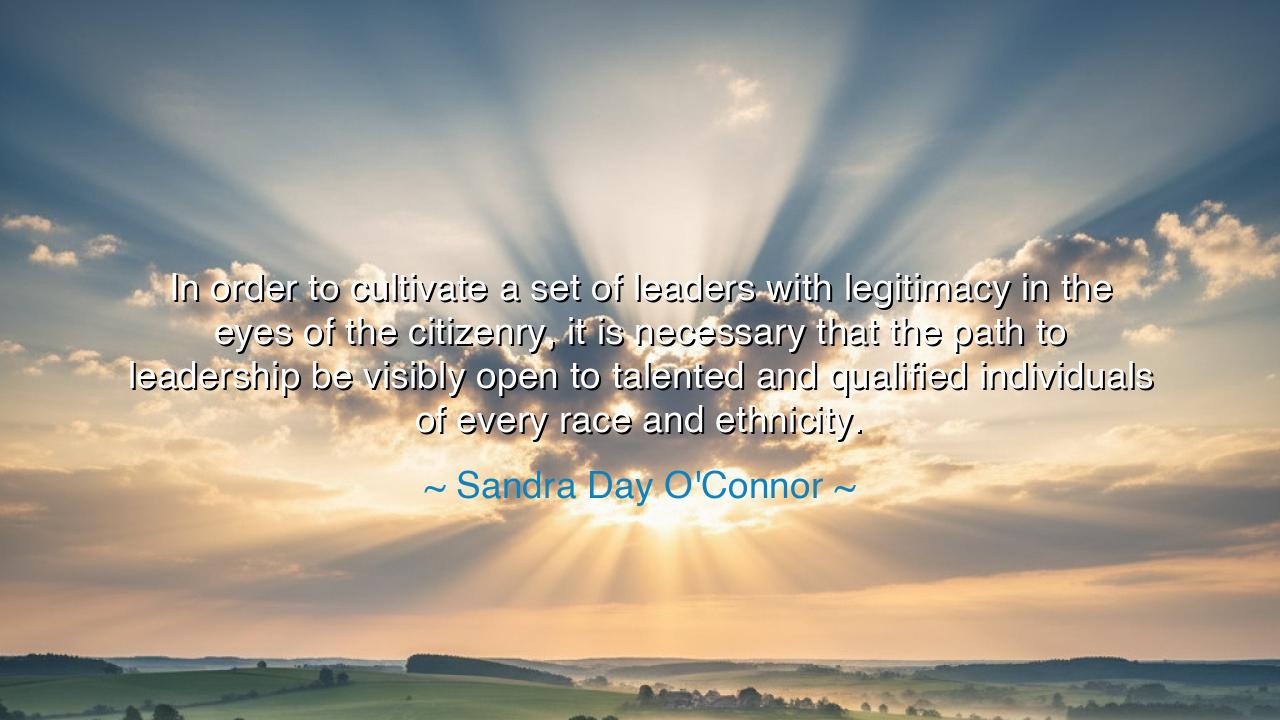
In order to cultivate a set of leaders with legitimacy in the
In order to cultivate a set of leaders with legitimacy in the eyes of the citizenry, it is necessary that the path to leadership be visibly open to talented and qualified individuals of every race and ethnicity.






Sandra Day O’Connor, the first woman to sit upon the high bench of the Supreme Court, spoke with clarity when she declared: “In order to cultivate a set of leaders with legitimacy in the eyes of the citizenry, it is necessary that the path to leadership be visibly open to talented and qualified individuals of every race and ethnicity.” These words ring not as mere commentary, but as a call to justice. For she reminds us that leadership is not only about ability, but about the trust of the people—and that trust can never flourish in a land where the gates of opportunity are locked against whole portions of humanity.
The origin of this truth lies in O’Connor’s long years of service, where she witnessed firsthand the struggle of America to reconcile its founding ideals with its lived realities. Born in a time when women were often excluded from positions of power, she herself walked the hard road to recognition. Her rise symbolized what she here declares: that the people must see the path to power as open to all, else they will believe their leaders serve only privilege and not the common good.
History abounds with proof of her wisdom. Consider the civil rights movement of the 20th century. For generations, African Americans were barred from the corridors of power, their voices silenced by law and by custom. Leadership in such a system lacked true legitimacy, for how can a government claim to represent its citizenry when entire races are excluded from its councils? It was only when the gates began to open—when figures like Thurgood Marshall, Shirley Chisholm, and later Barack Obama rose—that the promise of democracy began to align with its practice. Their ascent was not merely personal triumph; it was a signal to all that leadership was no longer the inheritance of one race alone.
The deeper meaning of O’Connor’s words is that legitimacy is born not only of competence but of inclusiveness. A leader may be wise and capable, but if the people see that the road he walked was denied to others of equal worth, they will not believe him just. To cultivate leaders is not enough; one must also cultivate the faith of the people in the fairness of the path. A true meritocracy exists only where the soil is level, where every seed, regardless of its color, may take root and rise.
Let us also remember the lessons of other lands. In South Africa, during the long night of apartheid, the government was led by men who claimed authority but lacked legitimacy, for the vast majority of the citizenry was denied the right to rise. When Nelson Mandela at last took his rightful place as leader, his legitimacy was not only in his character, but in the fact that his leadership symbolized the opening of the path to all. His very presence declared that the gates had been broken, and thus the people could believe again in the possibility of justice.
The lesson for us is urgent: if we desire leaders who are respected and trusted, we must labor to ensure that no race, no ethnicity, no child born in obscurity is told the path is closed. We must look not only to the leaders we raise up, but to the fields from which they come. Are the schools fair? Are the opportunities equal? Are the doors to power barred by invisible chains? These are the questions we must ask if we seek a leadership that the citizenry will honor.
Practical action lies before us. Support policies that expand access to quality education for all races and communities. Mentor the young, especially those from groups long excluded from power. Demand representation in workplaces, governments, and institutions that reflects the diversity of the people. And in your own sphere, resist prejudice, celebrate talent wherever it blooms, and open doors rather than close them. For in each act of fairness, you strengthen the legitimacy of tomorrow’s leaders.
Thus O’Connor’s words shine with enduring power: true leadership must be visibly open to all, lest it lose the trust of the people it claims to serve. Let us then cultivate a garden of leaders as diverse as the soil from which they spring, so that every citizen may see themselves reflected in the heights of power. Only then will leadership carry not only authority, but the sacred legitimacy that binds a people to their destiny.






AAdministratorAdministrator
Welcome, honored guests. Please leave a comment, we will respond soon